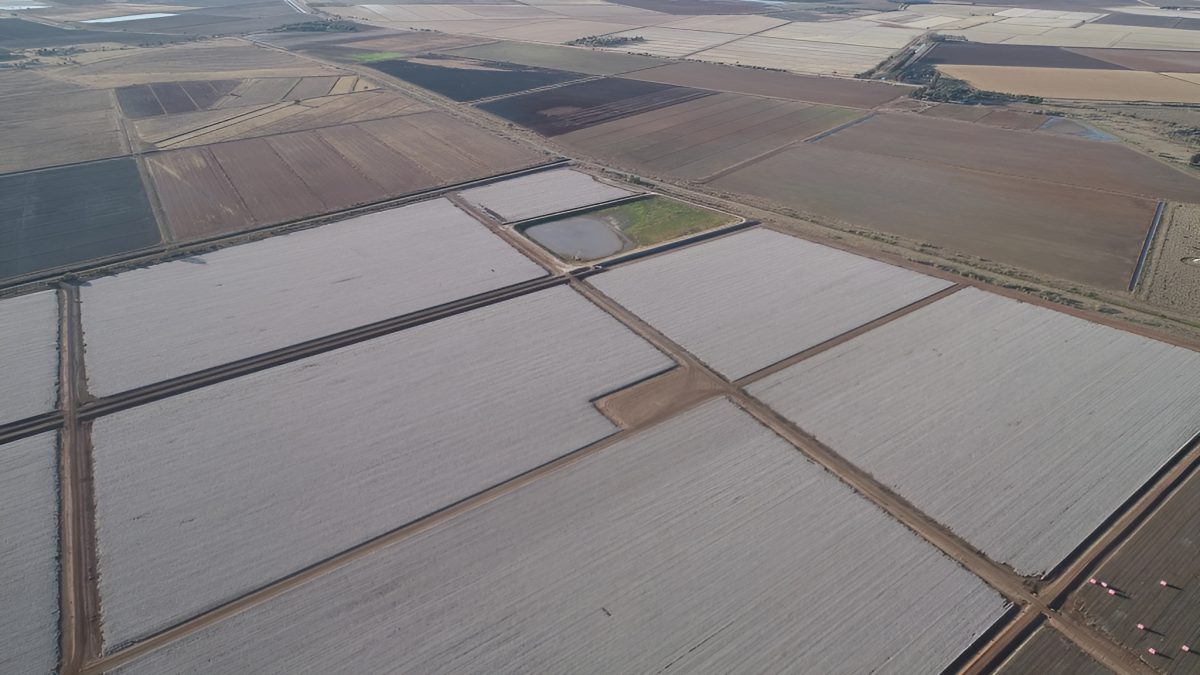
Hardy Irrigation Pty Ltd own cotton fields in the southern Riverina. Photo: Hardy Irrigation Pty Ltd Facebook.
A District Court Judge has found a Leeton crop duster liable to pay a client $673,518 after their cotton fields were severely damaged following aerial spraying to reduce weed growth.
According to the published judgement, the Hardy family, who own farmland between Coleambally and Jerilderie, contracted Leeton Aerial Ag Pty Ltd to carry out crop dusting on specific fields growing young cotton within their property in November 2022. The related company JN Aviation Pty Ltd carried out the work.
The cotton was to be sprayed with Weedmaster, a glyphosate product similar to Roundup, which is commonly used in domestic gardens.
Hardy Irrigation claimed the chemical compound 2,4-D was somehow mixed in with the Weedmaster while the spraying was done, causing poisoning and extensive damage to the cotton, which resulted in an economic loss.
Leeton Aerial Ag and JN Aviation Pty Ltd denied any liability, saying they did not spray the crops with any 2,4-D and did not cause the damage to the cotton. They suggested the poisoning could have been caused by “spray drift”, when harmful chemicals blow over from neighbouring properties.
The published judgement stated the herbicides sprayed by the crop duster were obtained direct from a supplier and delivered to the JN Aviation hangar in what is known as a shuttle – a 1000-litre plastic container with a lid on the top and a tap towards the bottom, via which the liquid inside can be extracted.
Hardy Irrigation’s lawyers argued there wasn’t any 2,4-D in the shuttle when herbicide was delivered. Nevertheless, after the spraying took place, there was observable damage to the crops, consistent with 2,4-D having been sprayed on the crops. The leaves had become shrivelled up, brittle, and displayed a distinctive style of what is known as “witches hands”. That damage was uniform and specific to the area that had been sprayed by JN Aviation Pty Ltd.
The Coleambally cotton growers said that when they collected the shuttle, there was 2,4-D in the residue in it, an assertion confirmed by CCTV footage. The residue was yellow (which indicates the presence of 2,4-D), and a subsequent chemical analysis of a sample of the residue in the shuttle arranged by their agronomist Brett Hay identified the Weedmaster as contaminated with 2,4-D.
District Court Judge Robert Newlinds SC ruled that on the balance of probabilities, 2,4-D poisoned the cotton and that the evidence did not support an alternative explanation of “spray drift”, because the damage was uniform.
“I am satisfied on the balance of probabilities that [the crop dusters], for reasons unknown, somehow mistakenly loaded Weedmaster contaminated with 2,4-D onto its plane, which was subsequently sprayed on the [Hardy’s] fields, causing it loss and damage, in that the yield of cotton from those fields was reduced,” Judge Newlands found.
After hearing calculations from both sides on the economic value of the loss from cotton that wasn’t able to go to market, the judge ruled that this should be quantified at $568,436.76 plus two years’ interest of $105,081.38.
Leeton Aerial Ag Pty Ltd and JN Aviation Pty Ltd were also ordered to pay for Hardy Irrigation’s legal costs for the civil hearings.







